227 scholarly books by Arc Humanities Press and 9
have author last names that start with A
227 scholarly books by Arc Humanities Press and 9
227 scholarly books by Arc Humanities Press
9 have author last names that start with A have author last names that start with A
9 have author last names that start with A have author last names that start with A
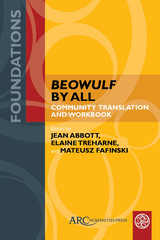
Beowulf by All
Community Translation and Workbook
Jean Abbott
Arc Humanities Press, 2021
This is a community translation of the earliest English epic poem. Beowulf tells the story of a mythical hero in northern Europe in, perhaps, the sixth century. Alongside his story, multiple other shorter narratives are told and many other voices are heard, making it a rich and varied account of the poet’s views of heroism, conflict, loyalty, and the human condition.
The poem is widely taught in schools and universities, and has been adapted, modernized, and translated dozens of times, but this is the first large-scale polyvocal translation.
Readers will encounter the voices of over two hundred individuals, woven together into a reading experience that is at once productively dissonant, yet strangely coherent in its extreme variation. We hope that it turns the common question "Why do we need yet another translation?" on its head, asking instead, "How can we hear from more translators?," and "How can previously unheard, or marginalized voices, find space, like this, in the world of Old English Studies?" With this in mind we invite a new generation of readers to try their own hand at translating Beowulf in the workbook space provided opposite this community translation.
It is often through the effort of translating that we see the reality of the original.
[more]
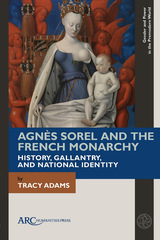
Agnès Sorel and the French Monarchy
History, Gallantry, and National Identity
Tracy Adams
Arc Humanities Press, 2022
Agnès Sorel (1428–1450), beautiful favourite of Charles VII of France and first in the long genealogy of French royal mistresses, was mysteriously poisoned in the prime of life. Agnès, part of a network of royal “favourites,” is equally interesting for her political activity. And yet, no scholarly study in English of her exists. This study brings her story to an English-speaking audience, examining her in her historical context, that is, the factional struggle for power waged against Charles VII by the dauphin Louis and the king’s final routing of the English. It then traces Agnès’s afterlife, exploring her roles as founding mother of the tradition of the French royal mistress and foil for the less popular holders of the “office”; as erotic fantasy figure for nineteenth-century historians “re-inventing” the Middle Ages; and, most recently, as poignant victim for fans of the true crime genre.
[more]
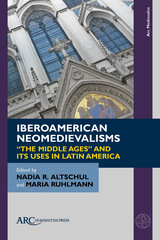
Iberoamerican Neomedievalisms
“The Middle Ages” and Its Uses in Latin America
Nadia R. Altschul
Arc Humanities Press, 2023
This is the first volume fully dedicated to Iberoamerican neomedievalisms. It examines “the Middle Ages” and its uses in Iberoamerica: the Spanish and Portuguese American postcolonies. It is an especially timely topic as scholars in neomedievalism studies become increasingly conscious that the field has different trajectories outside Europe and beyond the English-speaking world.
The collection provides needed alternatives to the by-now standardized understanding of neomedievalism as allied to nationalism, nostalgia, xenophobia, origin stories, elitism, and white Christian identity. It dislocates the field from its established trends and finds generative, yet unexplored examples of neomedievalism: political, religious, literary, and gendered. The volume will be of interest to established scholars of neomedievalism studies, to scholars of Latin America, and to the new and growing generation of students and colleagues interested in truly global neomedievalist studies.
[more]
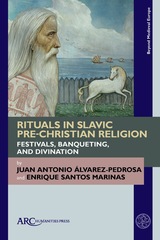
Rituals in Slavic Pre-Christian Religion
Festivals, Banqueting, and Divination
Juan Antonio Álvarez-Pedrosa
Arc Humanities Press, 2023
The authors comprehensively analyze all the available information regarding the ritual practices of Slavic pre-Christian religion that can be found in written medieval texts. After investigating every kind of reference to such practices, they offer a reconstruction of Slavic pre-Christian religion on the basis of these medieval testimonies. In doing so, they overcome the challenges presented by the fact that all of these sources are indirect, since the Slavs did not acquire literacy until they became Christians. Thus the writers of these texts mostly professed a monotheistic religion, being Christians and in some cases Muslims. The picture that they offer is biased and determined by their own faith. The present analysis innovatively combines testimonies from every Slavic area (Eastern, Western, and Southern), showing their mutual correspondences and emphasizing the relationship between the Slavic pre-Christian religion and its Indo-European roots.
[more]
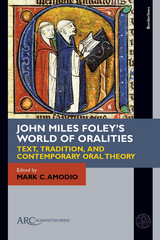
John Miles Foley's World of Oralities
Text, Tradition, and Contemporary Oral Theory
Mark C. Amodio
Arc Humanities Press, 2020
This collection brings together newly commissioned and cutting-edge essays on oral text and tradition ranging from the ancient and medieval world to the present day by a leading group of European and North American oral theorists. Using a range of materials including the Bible, Greek epic, Beowulf, Old Norse and Old English riddles, and medieval music, the contributors collectively work to refine, challenge, and further advance contemporary Oral Theory, an interdisciplinary school of thought heavily influenced by John Miles Foley, whose work provides the jumping-off point for this volume. The book includes a useful introduction to the history of oral theory and Foley’s ground-breaking and influential work.
[more]
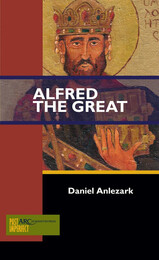
Alfred the Great
Daniel Anlezark
Arc Humanities Press, 2017
Alfred the Great is a rare historical figure from the early Middle Ages, in that he retains a popular image. This image increasingly suffers from the dead white male syndrome, exacerbated by Alfred's association with British imperialism and colonialism, so this book provides an accessible reassessment of the famous ruler of Wessex, informed by current scholarship, both on the king as a man in history, and the king as a subsequent legendary construct.Daniel Anlezark presents Alfred in his historical context, seen through Asser's Life, the Anglo Saxon Chronicle, and other texts associated with the king. The book engages with current discussions about the authenticity of attributions to Alfred of works such as the Old English Boethius and Soliloquies, and explores how this ninth-century king of Wessex came to be considered the Great king of legend.
[more]
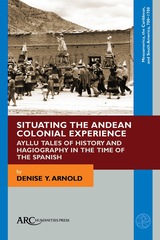
Situating the Andean Colonial Experience
Ayllu Tales of History and Hagiography in the Time of the Spanish
Denise Y. Arnold
Arc Humanities Press, 2021
Re-situating Andean colonial history from the perspective of the local historians of ayllu Qaqachaka, in highland Bolivia, this book draws on regional oral history combined with local and public written archives. Rejecting the binary models in vogue in colonial and postcolonial studies (indigenous/non-indigenous, Andean/Western, conquered/conquering), it explores the complex intercalation of legal pluralism and local history in the negotiations around Spanish demands, resulting in the so-called “Andean pact.”
The Qaqachaka’s point of reference was the preceding Inka occupation, so in fulfilling Spanish demands they sought cultural continuity with this recent past. Spanish colonial administration, with its roots in Roman-Germanic and Islamic law, infiltrated many practices into the newly-conquered territories. Two major cycles of ayllu tales trace local responses to these colonial demands, in the practices for establishing settlements, and the feeding and dressing of the Catholic saints inside the new church, with their forebears in the Inka mummies.
[more]
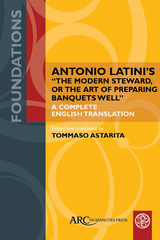
Antonio Latini’s "The Modern Steward, or The Art of Preparing Banquets Well"
A Complete English Translation
Tommaso Astarita
Arc Humanities Press, 2019
Antonio Latini’s masterpiece of Baroque cooking and household management was the earliest book to publish recipes using tomatoes and chilli peppers. This first complete English translation presents the text with contextual introduction and notes. <I>The Modern Steward</I> was published in Naples in 1692-94, and includes a wealth of recipes, plus discussions of the kitchen and serving staff, setting the table, menus, protocol, entertainment, wines, etc. It is the last great book of the Italian Renaissance and Baroque cooking tradition. The book will interest historians of early modern Italy, food, material culture, and the social and cultural life of the European elites, as well as connoisseurs of fine dining, and cooks.
[more]

Tales of Love, Cleverness, and Violence in Tomaso Costo’s "Fuggilozio" (1596)
Translated into English
Tommaso Astarita
Arc Humanities Press, 2024
This selection from Tomaso Costo’s Fuggilozio (The Cure for Indolence, 1596) translates entertaining, dramatic, or witty examples of the over four hundred stories and anecdotes of the original. Together, they offer an engaging window into the lively culture and society of Naples and Italy generally. Though the story-tellers are all from the city’s elite, the characters in the stories they tell run the social and professional gamut, from peasants to emperors, and the variety and brevity of the tales offers something for all readers who can smile at human foibles, silliness, and naughtiness, and admire cleverness and guile. Costo, in spite of his introductory claim that the book is meant to guide its audience to virtue and away from vice, also at times indulges in blunt innuendos and jokes that can still surprise us today.
[more]
READERS
Browse our collection.
PUBLISHERS
See BiblioVault's publisher services.
STUDENT SERVICES
Files for college accessibility offices.
UChicago Accessibility Resources
home | accessibility | search | about | contact us
BiblioVault ® 2001 - 2024
The University of Chicago Press









